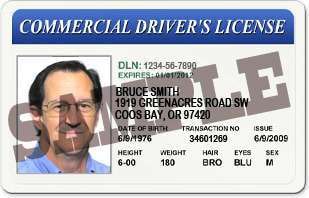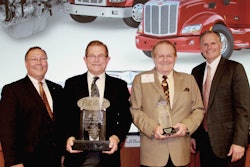CDL: A License To Tow
Towing more than 26K with that heavy-duty pickup? Let’s hope you have the proper driving license!
By G.R. Whale
(Article first published in 2011)
Most contractors are towing equipment trailers of one sort or another and they do so without giving a second thought about their driver’s license. That could be a costly mistake for those who are pushing the limits of their new heavy-duty pickup’s towing capacity.
Each of the major pickup manufacturers now offers one-ton dually pickups with a gross combined weight rating (GCWR) of more than 26,000 pounds.
And in many states, legally operating a pickup and/or a trailer combo exceeding 26,000 pounds may require a commercial driver’s license (CDL).
Unfortunately each state is allowed to set its own rules on commercial driver’s licensing; there are also Federal regulations and they more often involve interstate commerce and hazardous materials.
 Drivers operating newer one-ton pickups with a GVWR greater than 26,000 pounds might be required to have a commercial drivers license (CDL).
Drivers operating newer one-ton pickups with a GVWR greater than 26,000 pounds might be required to have a commercial drivers license (CDL).The Motor Carrier Safety Improvement Act of 1999 definition of a motor carrier of property (MCP) includes trucks with a GVWR of more than 10,000 pounds or any motor vehicle when used to transport any property for hire, including courier services.
So what may be legal in your state may not be under Federal rule or across the border 10 miles away, and the ticket could get expensive.
We’ve heard from RV’ers in the northeast finding their 20,000-pound combo – well within truck/trailer limits of 11,000 and 17,000 respectively – getting four-digit fines for not having a CDL.
(If that’s how they treat guests, imagine what commercial operators face.)
Generally 26,000 pounds is a threshold, usually by vehicle rating and not actual weight.
Other triggers include certain combinations like doubles or triples (of any size), type of hitch/trailer, passenger count (for compensation or non-profit use), tankers and hazardous materials [U.S. Department of Transportation (DOT) regulations 49 C.F.R. parts 172,173 and 177 address hazardous materials].
Hazardous materials usually have a minimum limit (e.g. 1,000 pounds, or 500 pounds transporting for hire), while transporting explosives, inhalation hazards and radioactive materials have lower limits.
It’s also possible your pool-service, right-of-way clearing and extermination business chemicals qualify.
And when it comes to your CDL, it carries a lot more responsibility than the typical driver’s license.
CDLs, which are linked state-to-state, have lower presumed-drunk blood-alcohol-content levels, so that beer after work could result in loss of the license. You can also loose your CDL with a pair of “serious” offenses or just one violation involving a train crossing.
Where do contractors need a CDL to tow heavy trailers with their pickups or pickups with a GCWR greater than 26,000 pounds?
Those questions can be answered by department of public safety, motor vehicles, or state police websites. When in doubt ask, and get the answer in writing.
We surveyed four states of varied geography to see what laws were in force in late 2011. The results are outlined below.
ALABAMA
CDL required for:
- (Class A) Articulated vehicles with trailer GVWR > 10,000 pounds and GCWR > 26,000 pounds.
- (Class B) Straight truck GVWR > 26,000 pounds and no trailer or trailer < 10,000 pounds.
- (Class C) Bus or vehicle < 26,000 GVWR and > 15 passengers or placard-required hazardous materials.
- Notes: Endorsements are required for doubles/triples, some passenger transport < 15 passengers, tankers, hazardous materials, and combo hazmat/tanker.
CALIFORNIA
CDL required for:
- Vehicles with a GVWR > 26,000 pounds.
- Vehicles designed, used, or maintained for carrying more than 10 passengers (including driver) for hire.
- Vehicles towing a vehicle or trailer with GVWR > 10,000 pounds.
- Vehicles transporting hazardous materials requiring placards.
- Vehicles towing two trailers or trailer and vehicle.
- Notes: Recreational not-for-hire travel trailers > 10,000 pounds GVWR and fifth-wheels > 15,000 pounds GVWR require a non-commercial Class A, as do livestock trailers > 10,000 pounds but < 15,000 pounds GVWR operated within 150 miles of the (home) farm to transport livestock.
TEXAS
CDL required for:
- A single vehicle with a GVWR > 26,000 pounds.
- A trailer with a GVWR of > 10,000 pounds if the GCWR is > 26,000 pounds.
- A vehicle designed to transport more than 15 persons (including driver).
- Any size vehicle which requires hazardous materials placards.
- Notes: some tankers may require a CDL based on size, purpose and/or contents.
WISCONSIN
CDL required for:
- Vehicles > 26,000 pounds determined by highest of the following: manufacturer GVWR; manufacturer GCWR when the towed unit has a GVWR, registered or actual weight > 10,000 pounds; actual weight; registered weight.
- Class A for any combination with a GVWR, actual or registered weight > 26,000 pounds provided the GVWR, actual or registered weight of the towed vehicle(s) is > 10,000 pounds.
- Class B for any single vehicle with a GVWR, actual or registered weight > 26,000 pounds, or such vehicle towing a vehicle with a GVWR, actual or registered weight of 10,000 pounds or less.
- Class C for any single vehicle with a GVWR, actual or registered weight of 26,000 pounds or less, (or such vehicle towing a vehicle less than 10,000 pounds) transporting hazardous materials requiring placarding or designed to carry 16 or more persons (including driver).
- Notes: If new to Wisconsin and you have CDL you must apply for new one within 30 days.
- Vehicles designed or used to carry 16 or more persons (driver included).
- Vehicles that carry hazardous materials that require placarding under federal law.











